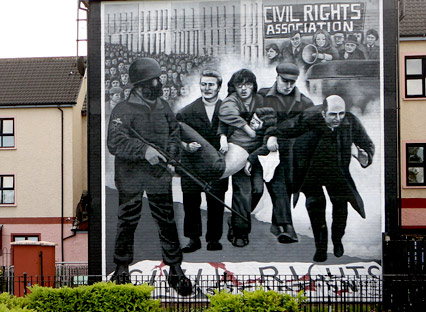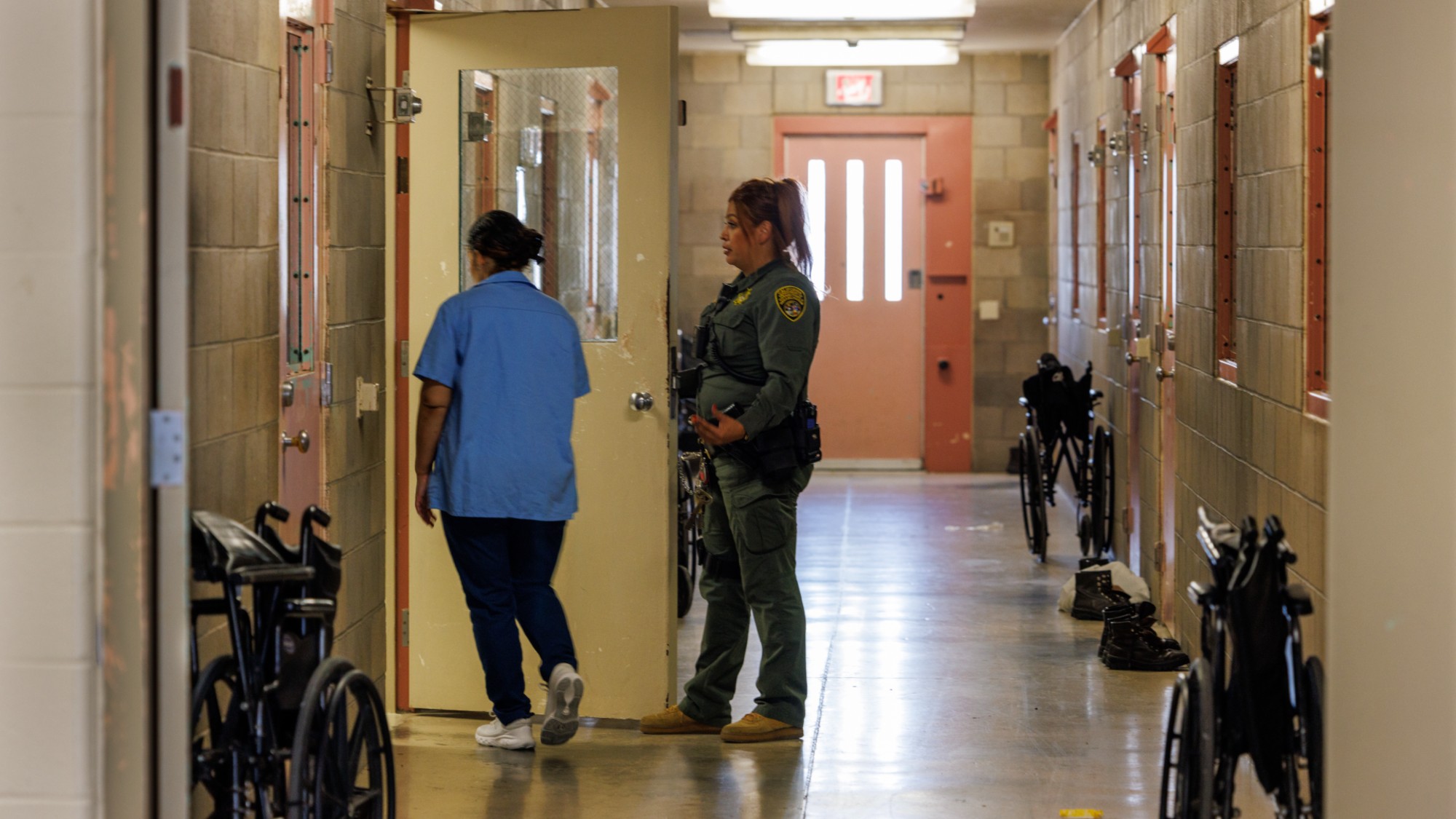Bloody Sunday troops ‘should be given immunity’
British soldiers should not face new inquiry, says former Northern Ireland Secretary Peter Hain

BRITISH soldiers who shot dead unarmed civilians during a civil rights march in 1972 should not face prosecution, the former Northern Ireland Secretary Peter Hain has said.
Police in the province have recently re-opened an investigation into the events of Bloody Sunday, in which 13 protesters were killed by members of the Parachute Regiment. A 14th man died later from his injuries.
Writing in the Sunday Telegraph, Hain said: “Difficult as I know it is for victims on all sides, I see no point in endlessly searching for evidence for crimes committed so many years ago in the Troubles and which is increasingly difficult if not impossible to get given the passage of time.
The Week
Escape your echo chamber. Get the facts behind the news, plus analysis from multiple perspectives.

Sign up for The Week's Free Newsletters
From our morning news briefing to a weekly Good News Newsletter, get the best of The Week delivered directly to your inbox.
From our morning news briefing to a weekly Good News Newsletter, get the best of The Week delivered directly to your inbox.
“If we are going to draw a line on historic and in all probability fruitless investigations, that must include the pursuit of soldiers involved in Bloody Sunday.”
Hain also defended an amnesty granted to IRA suspects while he was in office, which sparked anger last week.
On Monday the trial was halted of John Downey, who was charged last year with killing four British soldiers in a bomb attack in Hyde Park in 1982. A judge ruled that a letter sent in 2007 assuring Downey, now 62, that he would not face trial must be honoured, even though it had been sent by mistake.
The case led Northern Irish First Minister Peter Robinson to issue a threat of resignation, which he withdrew when David Cameron promised a judicial inquiry into the “get out of jail free” letters.
A free daily email with the biggest news stories of the day – and the best features from TheWeek.com
Northern Ireland: Cameron agrees to secret letters inquiry
February 28
DAVID CAMERON has agreed to a judicial inquiry into why 187 suspected IRA terrorist were given "get out of jail free" cards by the Government – prompting Northern Ireland's First Minister Peter Robinson to withdraw his threat to resign.
The secret letters were sent out to paramilitary suspects, dubbed 'on-the-runs', telling them that they were no longer wanted by police, as part of the Northern Ireland peace process.
Details of the scheme only came to light after the trial of a man suspected of the IRA bombing in Hyde Park in 1982 collapsed. John Downey, from County Donegal in the Republic of Ireland, had denied killing four soldiers in the attack and was due to stand trial at the Old Bailey.
But after seeing the letter, sent to him in 2007, the judge stopped his trial. It has since emerged that the letter was sent in error.
Downing Street has announced that the judge-led inquiry will produce a full public account of the government's 'on-the-runs' administrative scheme responsible for sending out the letters.
It will determine whether any other letters contained mistakes, but will have no impact on the decision not to appeal the Downey case, says the BBC.
The judge heading the inquiry will not be able to compel witnesses to attend and evidence will not be given in public. It will report back by the end of May and will be able to make recommendations.
The director of public prosecutions for Northern Ireland, Barra McGrory, has given his backing to the inquiry and the Northern Irish Assembly is due to discuss the letters in an emergency meeting later today.
Jim Allister, leader of the hard-line Traditional Unionist Voice party, said the review was a long way from what Robinson had originally demanded and accused the first minister of having "buckled within 24 hours of playing the hard man".
Northern Ireland crisis deepens as Villiers flies in
27 February
THERESA VILLIERS, the Northern Ireland Secretary, has met Deputy First Minister Martin McGuiness to discuss the growing political storm over a deal done with suspected IRA terrorists.
After the meeting, McGuinness said that all parties had been aware of the scheme in which "get out of jail free" cards were given to suspects as part of the peace process.
First Minister Peter Robinson said yesterday that he knew nothing of the scheme. He called on the letters to be rescinded and said he would quit his post unless the UK government set up a judicial inquiry.
The row was sparked by Monday's decision not to prosecute John Downey, who was charged last year with killing four British soldiers in a bomb attack in Hyde Park in 1982. A judge ruled that a letter sent in 2007 assuring Downey, now 62, that he would not face trial must be honoured, even though it had been sent by mistake.
What's the background to the case?
In 1982, an IRA car bomb in Hyde Park killed four soldiers and seven horses from the Blues and Royals regiment. Hours later, seven bandsmen from the Royal Green Jackets were killed by another bomb in Regent's Park.
Why is it back in the news now?
In May last year, John Downey was arrested at Gatwick Airport and charged with the four Hyde Park murders. He had been "convicted of IRA membership in the 1970s," the BBC reports, and "linked to the attack by fingerprints found on a parking ticket bought for the car used to transport the bomb."
Although police said that he had long been a prime suspect in the case, he had never been extradited from the Republic of Ireland. He denied the charges of murder and conspiring to cause an explosion. A judge ruled yesterday that Downey must not be prosecuted because police had previously told him that he would not face trial.
Why was he given this assurance?
As part of the Northern Ireland peace process, prisoners convicted of terrorism offences during the troubles were released in 1998. That created an anomaly: suspects who remained on the run could not benefit from that amnesty. Years later, the UK government addressed the problem by telling many men suspected of terrorist offences that they would no longer face charges.
Writing in The Guardian, Peter Hain, who was then Northern Ireland Secretary, said there had been no blanket granting of immunity. Cases were reviewed, he said, and "if there was insufficient evidence to enable a prosecution, the people involved received an official letter from a Northern Ireland official: 187 of them did so, Downey included".
Should he have received the letter?
Apparently not. The letter informed Downey that "there are no warrants in existence", but in fact there was still an outstanding UK warrant for his arrest.
"The Crown Prosecution Service had argued that the assurance was given in error," the BBC reports, "but the judge said it amounted to a 'catastrophic failure' that misled the defendant." The judge, Mr Justice Sweeney, therefore ruled that the case should not proceed.
What is the political fall-out?
David Cameron today described the letter sent to Downey as a "dreadful mistake", but it is in Northern Ireland that the effects are likely to be most keenly felt. Peter Robinson, the First Minister, has suggested that deals made with terrorism suspects undermine the rule of law, and demanded an inquiry.
"I am not prepared to be kept in the dark by Her Majesty's government about matters relevant to Northern Ireland," he said, according to the Daily Telegraph. "I want a full judicial inquiry to find out who knew, when they knew and what they knew. I want to know who they are and what crimes they are believed to have committed."
-
 High Court action over Cape Verde tourist deaths
High Court action over Cape Verde tourist deathsThe Explainer Holidaymakers sue TUI after gastric illness outbreaks linked to six British deaths
-
 The battle over the Irish language in Northern Ireland
The battle over the Irish language in Northern IrelandUnder the Radar Popularity is soaring across Northern Ireland, but dual-language sign policies agitate division as unionists accuse nationalists of cultural erosion
-
 Villa Treville Positano: a glamorous sanctuary on the Amalfi Coast
Villa Treville Positano: a glamorous sanctuary on the Amalfi CoastThe Week Recommends Franco Zeffirelli’s former private estate is now one of Italy’s most exclusive hotels
-
 The high street: Britain’s next political battleground?
The high street: Britain’s next political battleground?In the Spotlight Mass closure of shops and influx of organised crime are fuelling voter anger, and offer an opening for Reform UK
-
 Is a Reform-Tory pact becoming more likely?
Is a Reform-Tory pact becoming more likely?Today’s Big Question Nigel Farage’s party is ahead in the polls but still falls well short of a Commons majority, while Conservatives are still losing MPs to Reform
-
 Taking the low road: why the SNP is still standing strong
Taking the low road: why the SNP is still standing strongTalking Point Party is on track for a fifth consecutive victory in May’s Holyrood election, despite controversies and plummeting support
-
 What difference will the 'historic' UK-Germany treaty make?
What difference will the 'historic' UK-Germany treaty make?Today's Big Question Europe's two biggest economies sign first treaty since WWII, underscoring 'triangle alliance' with France amid growing Russian threat and US distance
-
 Is the G7 still relevant?
Is the G7 still relevant?Talking Point Donald Trump's early departure cast a shadow over this week's meeting of the world's major democracies
-
 Angela Rayner: Labour's next leader?
Angela Rayner: Labour's next leader?Today's Big Question A leaked memo has sparked speculation that the deputy PM is positioning herself as the left-of-centre alternative to Keir Starmer
-
 Is Starmer's plan to send migrants overseas Rwanda 2.0?
Is Starmer's plan to send migrants overseas Rwanda 2.0?Today's Big Question Failed asylum seekers could be removed to Balkan nations under new government plans
-
 'Incarceration profoundly affects families and communities'
'Incarceration profoundly affects families and communities'Instant Opinion Opinion, comment and editorials of the day